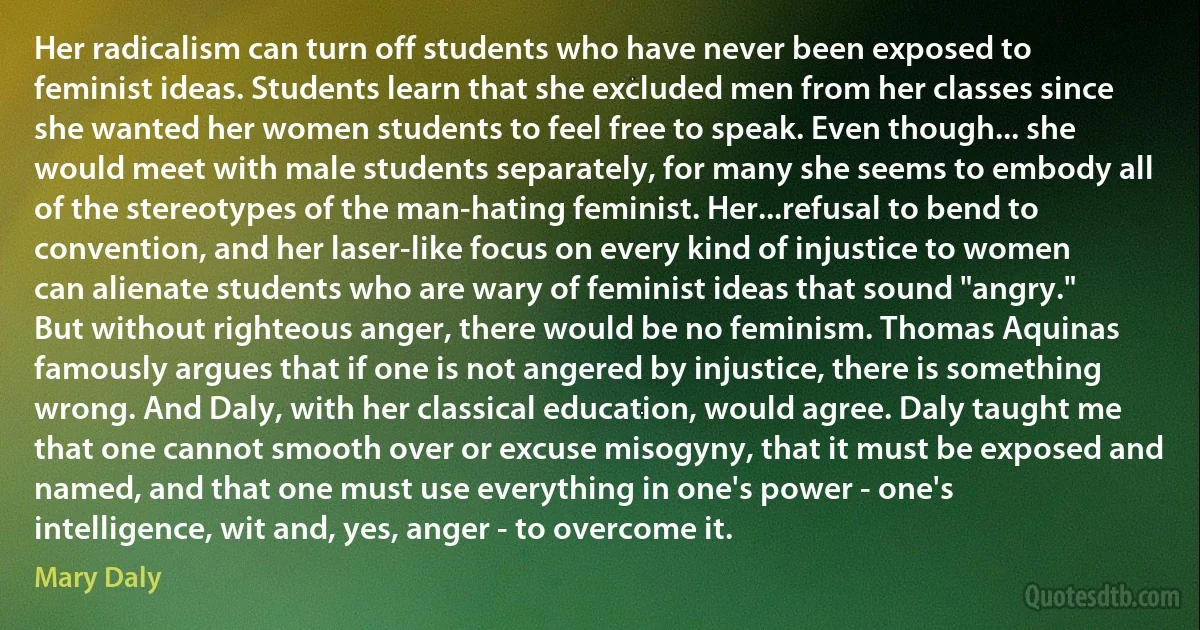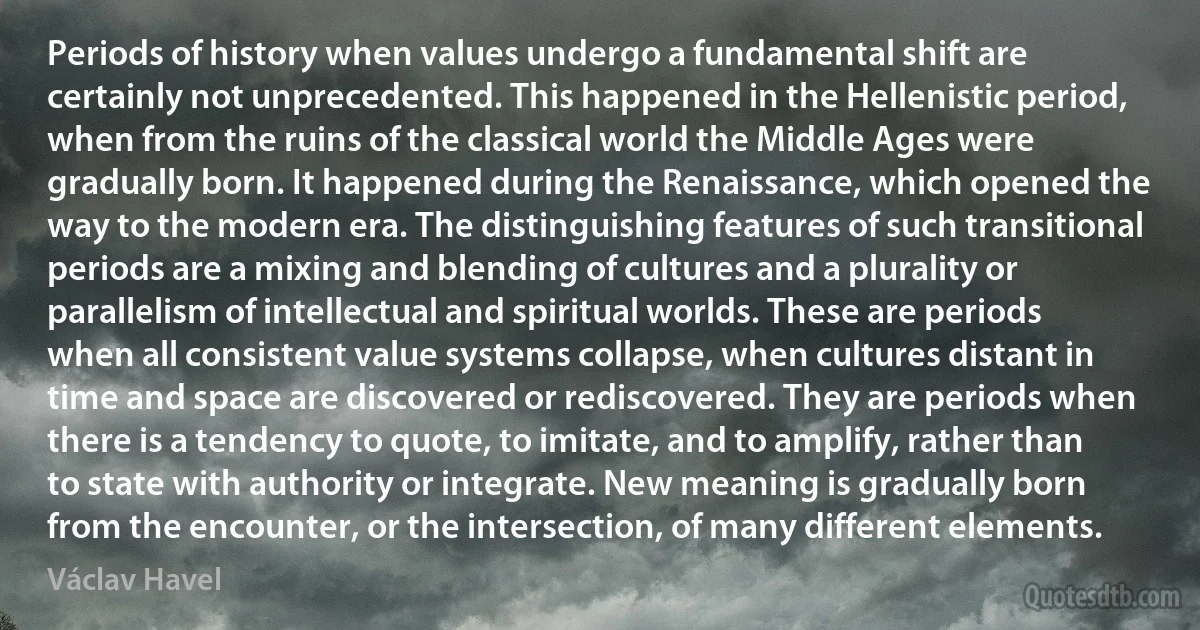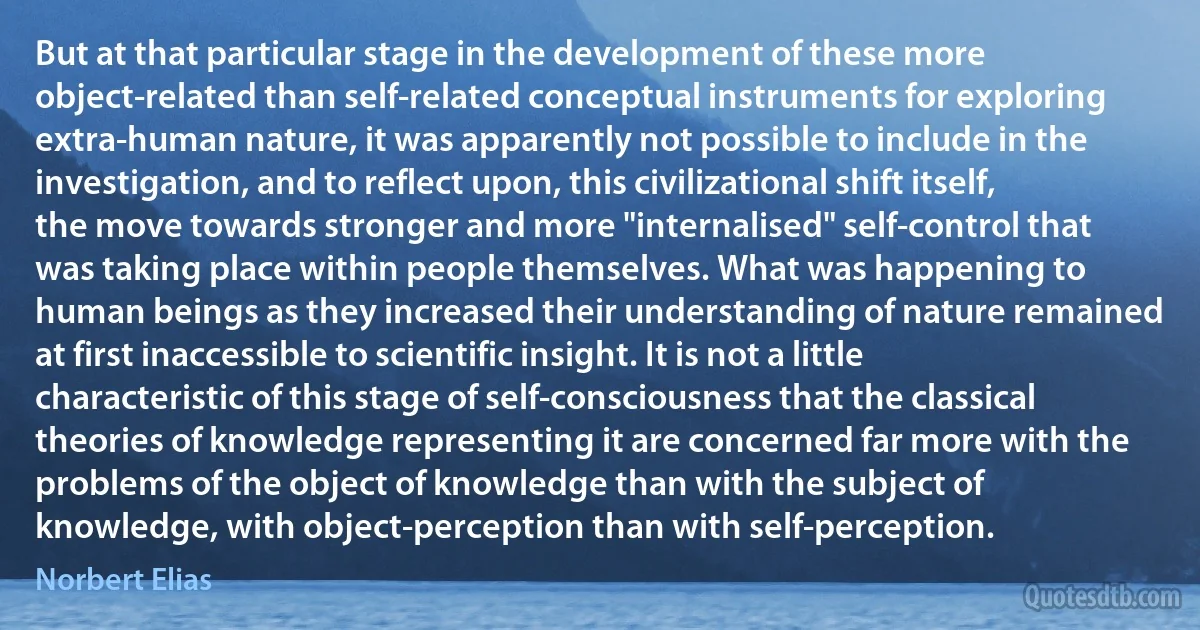Classical Quotes - page 32
Eventually the old ideas will no longer serve, the old ideological framework can no longer be tinkered up to bear the weight of the facts, and a radical reconstruction becomes necessary, leading eventually to the emergence of a quite new organisation of thought and belief, just as the emergence of new types of bodily organization was necessary to achieve biological advance. Such major organizations of thought may be necessary in science as much as in religion. The classical example, of course, was the re-patterning of cosmological thought which demoted the earth from its central position and led to the replacement of the geocentric pattern of thought by a heliocentric one. I believe that an equally drastic reorganization of our pattern of religious thought is now becoming necessary, from a god-centered to an evolutionary-centered pattern.

Julian Huxley
I suddenly realized that in the language, or at any rate in the spirit of the Glass Bead Game, everything actually was all-meaningful, that every symbol and combination of symbols led not hither and yon, not to single examples, experiments, and proofs, but into the center, the mystery and innermost heart of the world, into primal knowledge. Every transition from major to minor in a sonata, every transformation of a myth or a religious cult, every classical or artistic formulation was, I realized in that flashing moment, if seen with a meditative mind, nothing but a direct route into the interior of the cosmic mystery, where in the alternation between inhaling and exhaling, between heaven and earth, between Yin and Yang, holiness is forever being created.

Hermann Hesse
I am always interested in the ways of scoring the sound of the poem, especially a poem with long lines. Spaces within a line, double colons, slashes, are indications of pause, of breath, of urgency, they are not metrically exact as in a musical notation but they serve (I hope) to make the reader think about the sound of the poem-just as traffic symbols, when driving, make us almost unconsciously aware of a steep hill, an intersection, an icy bridge etc. Poets have used such indicators long before modernism-Dickinson's dashes and capitals are one example. Contemporary composers have also expanded on classical notation with new, self-invented markings. You want to find a way that is not random or chaotic but allows for various renderings of a line, a punctuation of the imagination.

Adrienne Rich
My father Ustaad Fateh Ali Khan, Ustad Mubarak Ali Khan and Ustad Salamat Ali Khan, his brothers are my spritual gurus. I am their son, their acolyte. It is my duty to preserve and protect the knowledge the music that they gave me. I do a lot of experiments but the base is classical music. I ambound with ragas. I may road around the world and may acquaint myself with the western instuments I never wander from the central point. from the stage of WOMAD and from the studios of Peter Gabriel, I always emerge depths of my own music.[citation needed].

Nusrat Fateh Ali Khan
If all that divides Marx from the Classical Economists amounts to the historical character of economic categories, Marx need only historicize these categories, refusing to take them as fixed, absolute or eternal, but, on the contrary, regarding them as relative, provisional and transitory, i.e., as categories subject in the last instance to the moment of their historical existence. In this case, Marx's relation to Smith and Ricardo can be represented as identical with Hegel's relation to classical philosophy. Marx would then be Ricardo set in motion, just as it is possible to describe Hegel as Spinoza set in motion; set in motion, i.e., historicized.

Baruch Spinoza
Vygotsky studied the classical German philosophy on a professional level. In his student years began his acquaintance with the philosophy of Marxism, which he studied mainly using illegal editions. At this time was born Vygotsky's interest in the philosophy of Spinoza, who would remain his favorite thinker for the rest of his life.

Baruch Spinoza
In our study of applying quantum to cognition we have identified five main aspects that play a fundamental role and that are specific to quantum structures as compared to classical structures. They are (i) contextual in influence (ii) emergence due to superposition, (iii) interference, (iv) entanglement and (v) quantum field theoretic aspects.

Diederik Aerts
Drink, of course, was what we all turned to, some more, some less. Don't ask how we got the money for it. When all the decent pleasures are forbidden, there's always ways to get the rotten ones. You don't break into grocery stores after dark and you don't pick your fellow's pockets to buy classical symphonies or fishing tackle, but if it's to get stinking drunk and forget-you do.

John Galt
His superiority was, indeed, real and incontestable; he was the classical ornament of the anti-slavery party; their pride in him was unbounded, and their admiration outspoken.The boy Henry worshipped him, and if he ever regarded any older man as a personal friend, it was Mr. Sumner. The relation of Mr. Sumner in the household was far closer than any relation of blood. None of the uncles approached such intimacy. Sumner was the boy's ideal of greatness; the highest product of nature and art. The only fault of such a model was its superiority which defied imitation. To the twelve-year-old boy, his father, Dr. Palfrey, Mr. Dana, were men, more or less like what he himself might become; but Mr. Sumner was a different order - heroic.

Henry Adams
The computer's most profound aesthetic implication is that we are being forced to dismiss the classical view of art and reality which insists that man stand outside of reality in order to observe it, and, in art, requires the presence of the picture frame and the sculpture pedestal. The notion that art can be separated from its everyday environment is a cultural fixation [in other words, a mythic structure] as is the ideal of objectivity in science. It may be that the computer will negate the need for such an illusion by fusing both observer and observed, "inside" and "outside." It has already been observed that the everyday world is rapidly assuming identity with the condition of art.

Jack Burnham
National Socialism is the fulfillment of Continental "liberalism" which stems largely from Rousseau [...] The continental Liberals never were liberals in the English sense [i.e., never were classical liberals ]; their "liberalism" was nothing else but the struggle against the existing order and the old tradition. Foolishly enough the English Liberals supported their continental "coreligionists," never being fully aware of the abyss which actually divided them.

Jean-Jacques Rousseau
The first great frontal assault on the Enlightenment was launched by Jean-Jacques Rousseau (1712-1778). Rousseau has a well-deserved reputation as the bad boy of eighteenth century French philosophy. In the context of Enlightenment intellectual culture, Rousseau's was a major dissenting voice. He was an admirer of all things Spartan-the Sparta of militaristic and feudal communalism-and a despiser of all things Athenian-the classical Athens of commerce, cosmopolitanism, and the high arts. Civilization is thoroughly corrupting, Rousseau argued -- not only the oppressive feudal system of eighteenth-century France with its decadent and parasitical aristocracy, but also its Enlightenment alternative with its exaltation of reason, property, the arts and sciences. Name a dominant feature of the Enlightenment, and Rousseau was against it.

Jean-Jacques Rousseau
In the new pattern of thought we do not assume any longer the detached observer, occurring in the idealizations of this classical type of theory, but an observer who by his indeterminable effects creates a new situation, theoretically described as a new state of the observed system. In this way every observation is a singling out of a particular factual result, here and now, from the theoretical possibilities, therefore making obvious the discontinuous aspect of physical phenomena.
Nevertheless, there remains still in the new kind of theory an objective reality, inasmuch as these theories deny any possibility for the observer to influence the result of a measurement, once the experimental arrangement is chosen. Therefore particular qualities of an individual observer do not enter into the conceptual framework of the theory.

Wolfgang Pauli
The notion of individualism that has emerged in the West is a relatively recent development even though it is often claimed to be derived from classical antiquity and Abrahamic theological tenets. This revisionist claim of being the exclusive and defining feature of the West – in contradistinction to the putative Oriental lack of individuality – is the result of myth-making.

Rajiv Malhotra
Not only is this close correlation between democracy and dictatorship troublesome for democratic-peace theorists; worse, they must come to grips with the fact that the dictatorships emerging from crises of democracy are by no means always worse, from a classical liberal or libertarian view, than what would have resulted otherwise. Cases can be easily cited where dictatorships were preferable and an improvement. Think of Italy and Mussolini or Spain and Franco.

Hans-Hermann Hoppe
I grew up believing that the novel has nothing to do with pure literature. So I was taught by scholars. The art of literature, so I was taught, is something devised by men of learning. Out of the brains of scholars came rules to control the rush of genius, that wild fountain which has its source in deepest life. Genius, great or less, is the spring, and art is the sculptured shape, classical or modern, into which the waters must be forced, if scholars and critics were to be served. But the people of China did not so serve. The waters of the genius of story gushed out as they would, however the natural rocks allowed and the trees persuaded, and only common people came and drank and found rest and pleasure. For the novel in China was the peculiar product of the common people. And it was solely their property.

Pearl S. Buck
Beauty is always the result of an accident. Of a violent lapse between acquired habits and those yet to be acquired. It baffles and disgusts. It may even horrify. Once the new habit has been acquired, the accident ceases to be an accident. It becomes classical and loses its shock value.

Jean Cocteau
As modern interpolators... say, the bubonic plague winnowed down Europe's population to a scale more congenial with its resource base. After that big first wave of the disease, [the] land was cheaper and human labor better rewarded. Eventually, more food got around. Incidentally, the plague provoked nostalgia for the classical antiquity of Greece and Rome, especially among the scholars of Florence, launching the extravaganzas of the Renaissance [which led to the Age of Exploration and the Scientific Revolution], the Enlightenment [which led to the Industrial Revolution which, in turn, led] [...] eventually [to] our own pageant of techno-supremacist Modernity [which led to the problems we face today].

James Howard Kunstler



